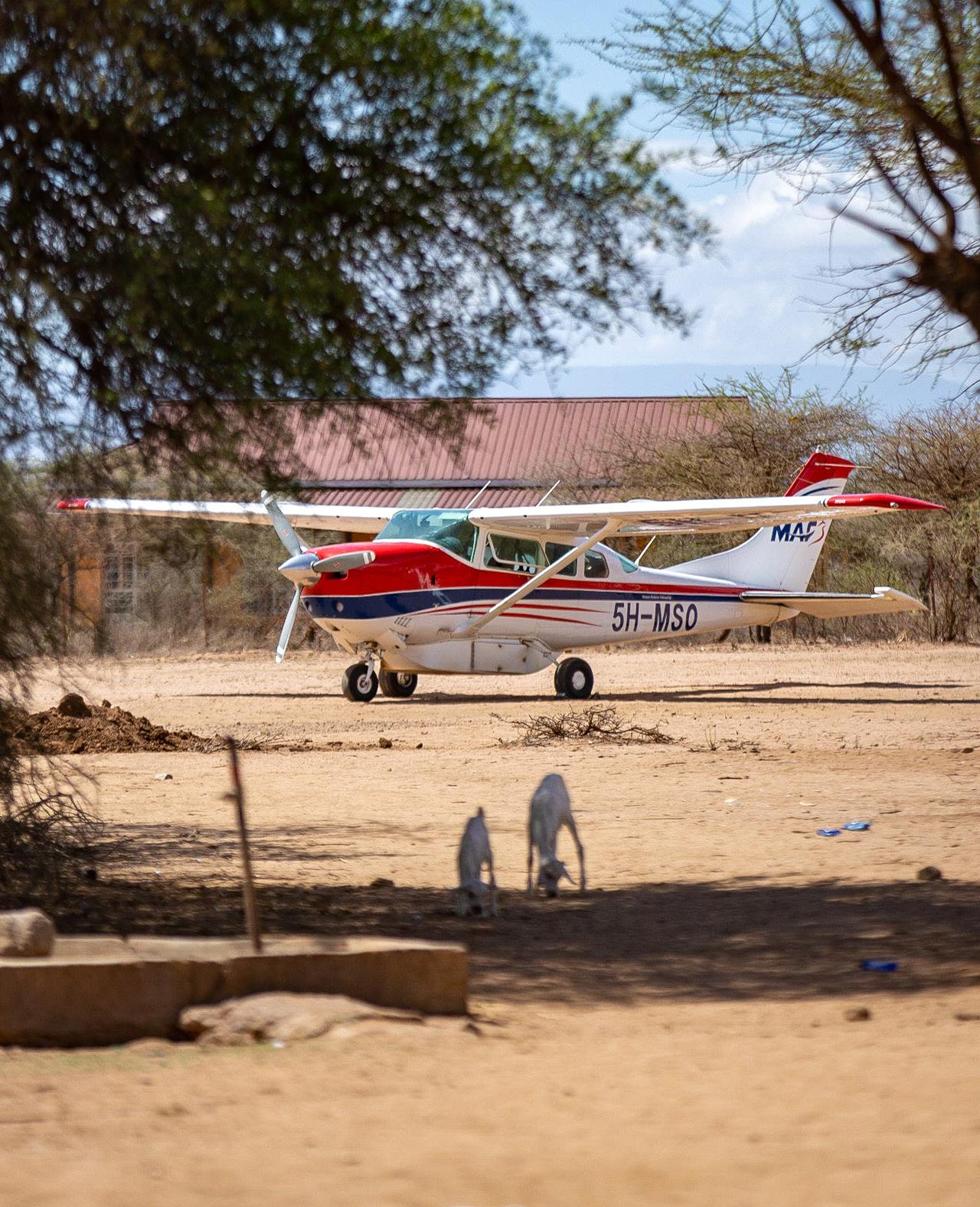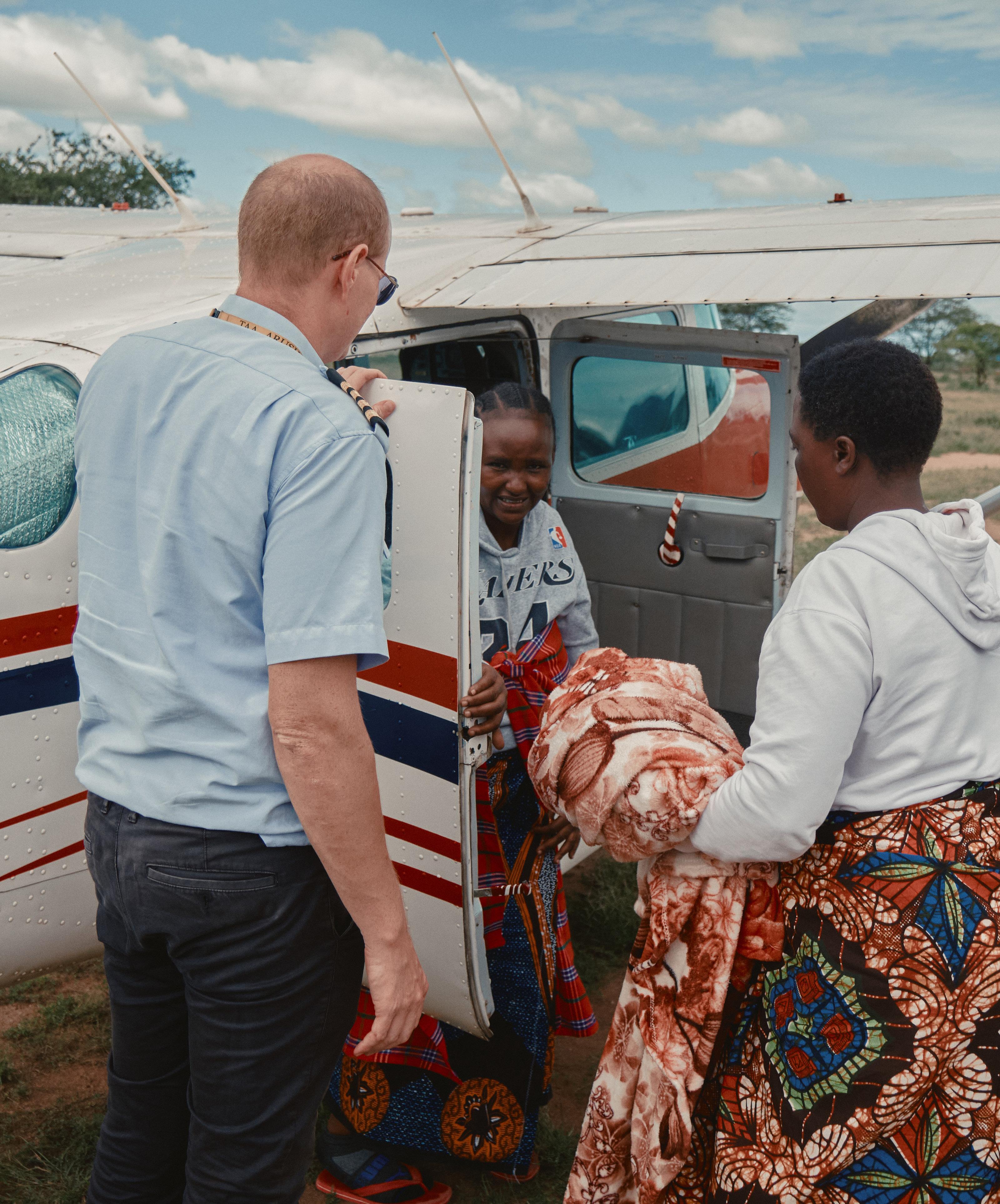




info@maf.org.nz
0800 87 85 88
MAF (Mission Aviation Fellowship) is a Christian organisation reaching men, women and children in more than 25 countries. Operating 120 aircraft, MAF’s pilots overcome terrain that has become inaccessible due to derelict roads, natural disaster, or violent conflict. MAF aircraft service more than 1,000 destinations - transporting food, water, health professionals, medical supplies, emergency workers and Christian missionaries where they are needed most. Each flight brings practical help, spiritual hope and physical healing to thousands of isolated people in remote communities for whom flying is a lifeline not a luxury. MAF is flying for life.
Front cover
MAF is flying for life in Tanzania
Justin Maclean
Back cover
MAF is flying for life in Tanzania
Jean Bizimana
Flying for Life Magazine NZ
Editor: Zoë Davies
Email: comms@maf.org.nz
Designer: Zoë Davies
Printer: Roe Print Services
©MAF NZ Winter 2024
MAF NZ
www.maf.org.nz
info@maf.org.nz
0800 87 85 88 PO Box
Registered charity in New Zealand.
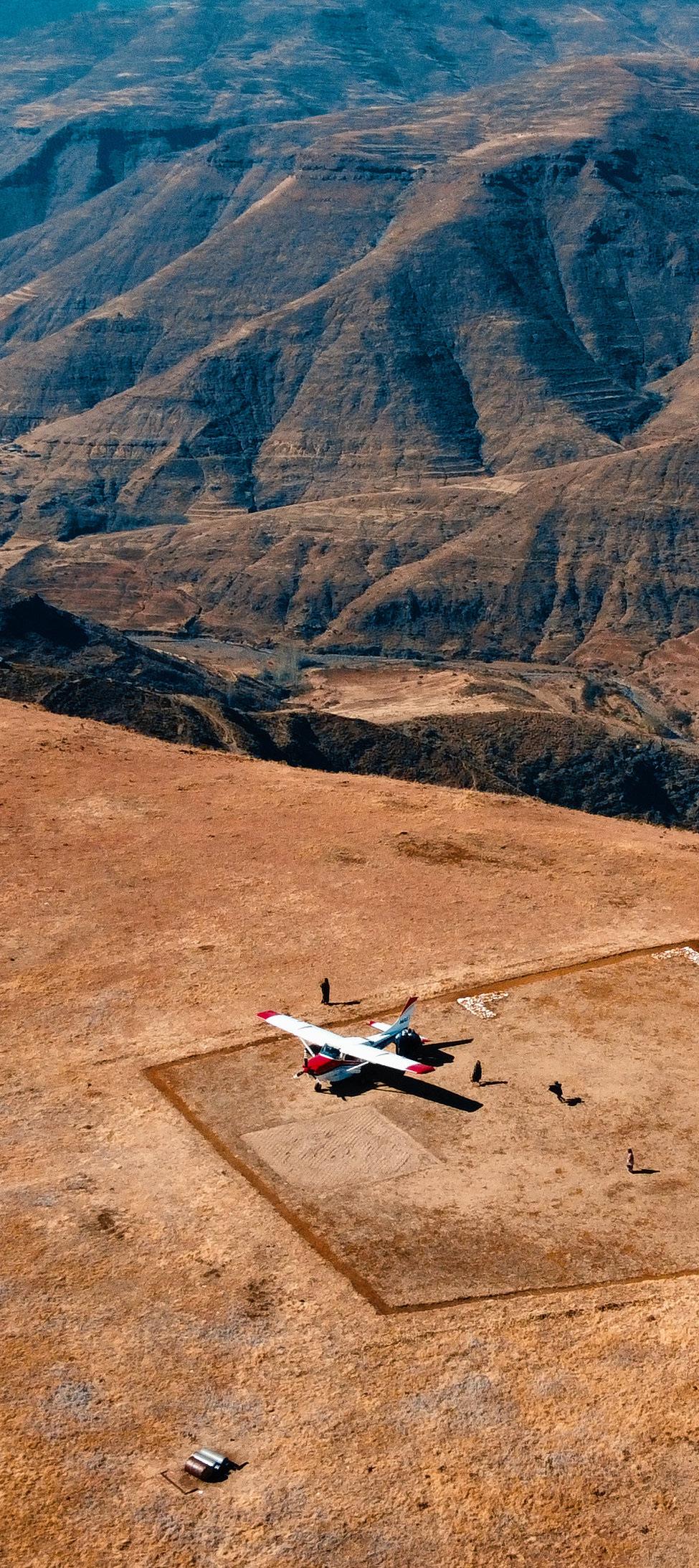

‘Hello’, from our CEO
In this issue of Flying for Life we wanted to feature some incredible stories from the continent of Africa. On the following page you will find a map showing the 12 countries in which MAF serves across Africa, and some of the key information about each of those programmes.
It is humbling to think that so far away in New Zealand, we are a part of such significant work across Africa. Many huminatarian and Christian organisations working in Africa strongly rely on MAF in order to do what they do.
I hope that as you read the stories from Liberia, Uganda, Guinea, Chad and South Sudan, it will help paint a picture of the significance of what your partnership with MAF can accomplish.
As we focus on Africa, I want to celebrate our two Kiwi pilots serving in South Sudan, Jono Pound and Andy Macdonald. Jono has been serving since 2022, and Andy since 2015. In our Spring 2023 issue we highlighted some of the realities of war-torn Sudan and South Sudan. It requires great courage, grit and faith to continue to joyfully serve as Jono and Andy do.
I pray that the stories within these pages would inspire you to also be a person of courage, grit and faith. I invite you to consider becoming a part of the MAF story yourself - bringing help hope and healing to isolated people through service or generosity.
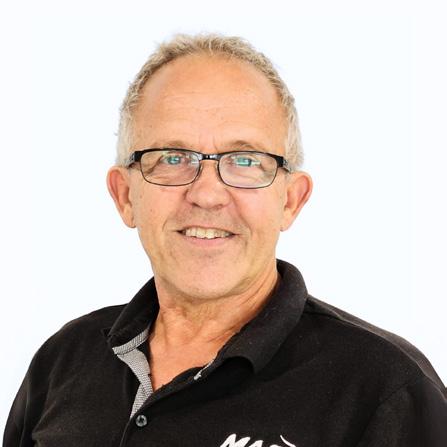

Mark Fox, CEO, MAF NZ
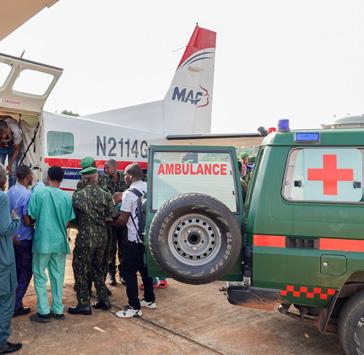
Main Base: Lubango Programme began: 1989
Aircraft: 3
Staff: 4 International, 14 National ANGOLA
Main Base: N’Djamena Programme began: 1966
Aircraft: 2
Staff: 4 International, 11 National CHAD
D.R.C
Main Base: Bunia (east), Kinshasa (west)
Programme began: 1961
Aircraft: 7
Staff: Bunia: 9 International, 33 National. Kinshasa: 8 International, 26 National
Main Base: Conakry Programme began: 2022
Aircraft: 1
Staff: 2 International, 2 National GUINEA
Main Base: Nairobi Programme began: 1959
Aircraft: 2
Staff: 4 International, 22 National KENYA
Main Base: Maseru Programme began: 1980
Aircraft: 4
Staff: 6 International, 15 National LESOTHO
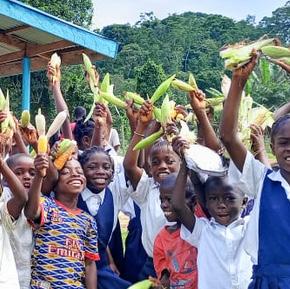
MAF responds bus accident in
Rescuing children the streets of Liberia
Main Base: Monrovia Programme began: 2015
Aircraft: 3
Staff: 6 International, 10 National LIBERIA
Main Base: Antananarivo Programme began: 1988
Aircraft: 3
Staff: 5 International, 21 National MADAGASCAR
Main Base: Nampula Programme began: 1999
Aircraft: 2
Staff: 7 International, 21 National MOZAMBIQUE
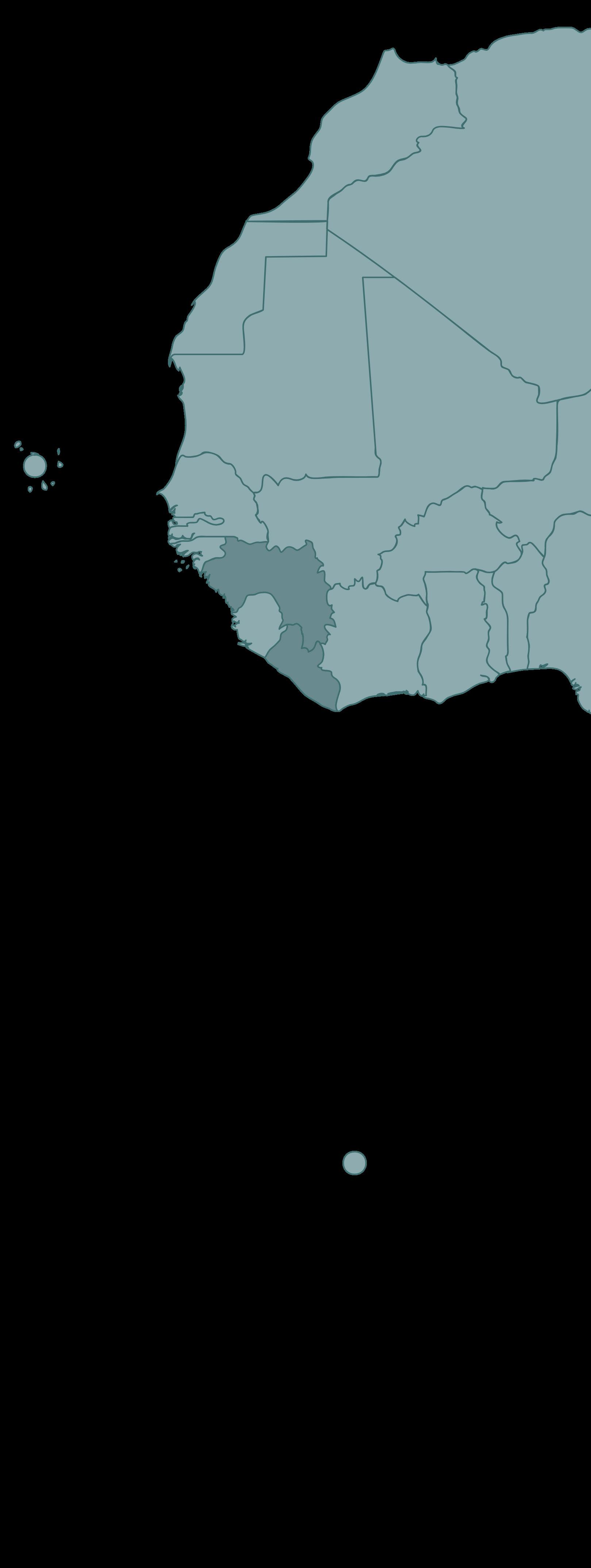
Main Base: Juba Programme began: 1950
Aircraft: 7
Staff: 15 International, 32 National SOUTH SUDAN
Main Base: Arusha Programme began: 1977
Aircraft: 2
Staff: 3 International, 3 National TANZANIA
Main Base: Kampala Programme began: 1987
Aircraft: 5
Staff: 13 International, 54 National UGANDA
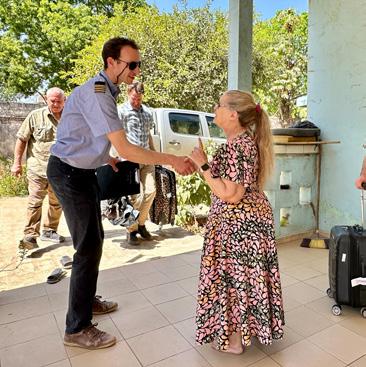
to horror in Guinea 06
children off Liberia
10
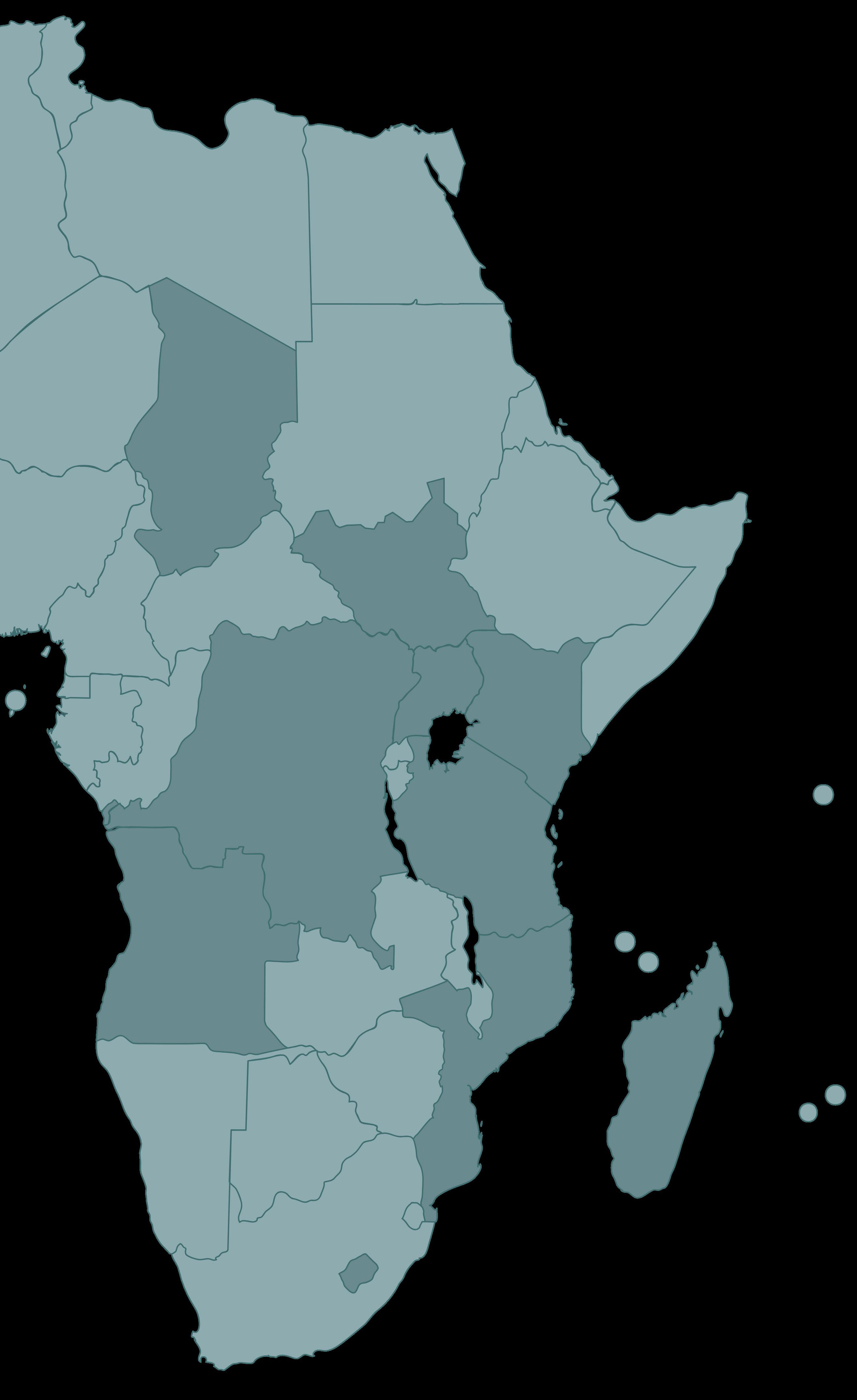
DEMOCRATIC REPUBLIC OF CONGO
Equipping the persecuted Church in Chad
12
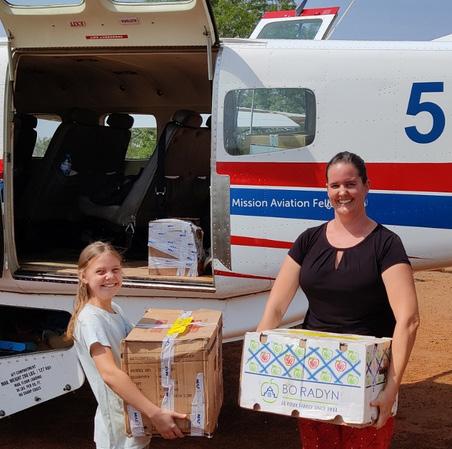
Sending love to other missionary families in South Sudan
14
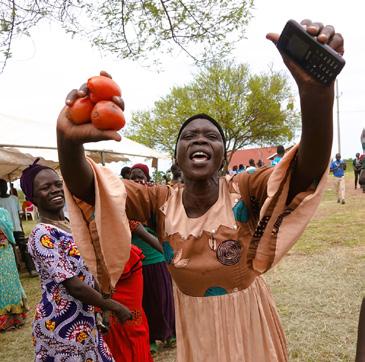
Bringing joy to 200,000 refugees in Uganda
08
= Country MAF serves = Story in this issue
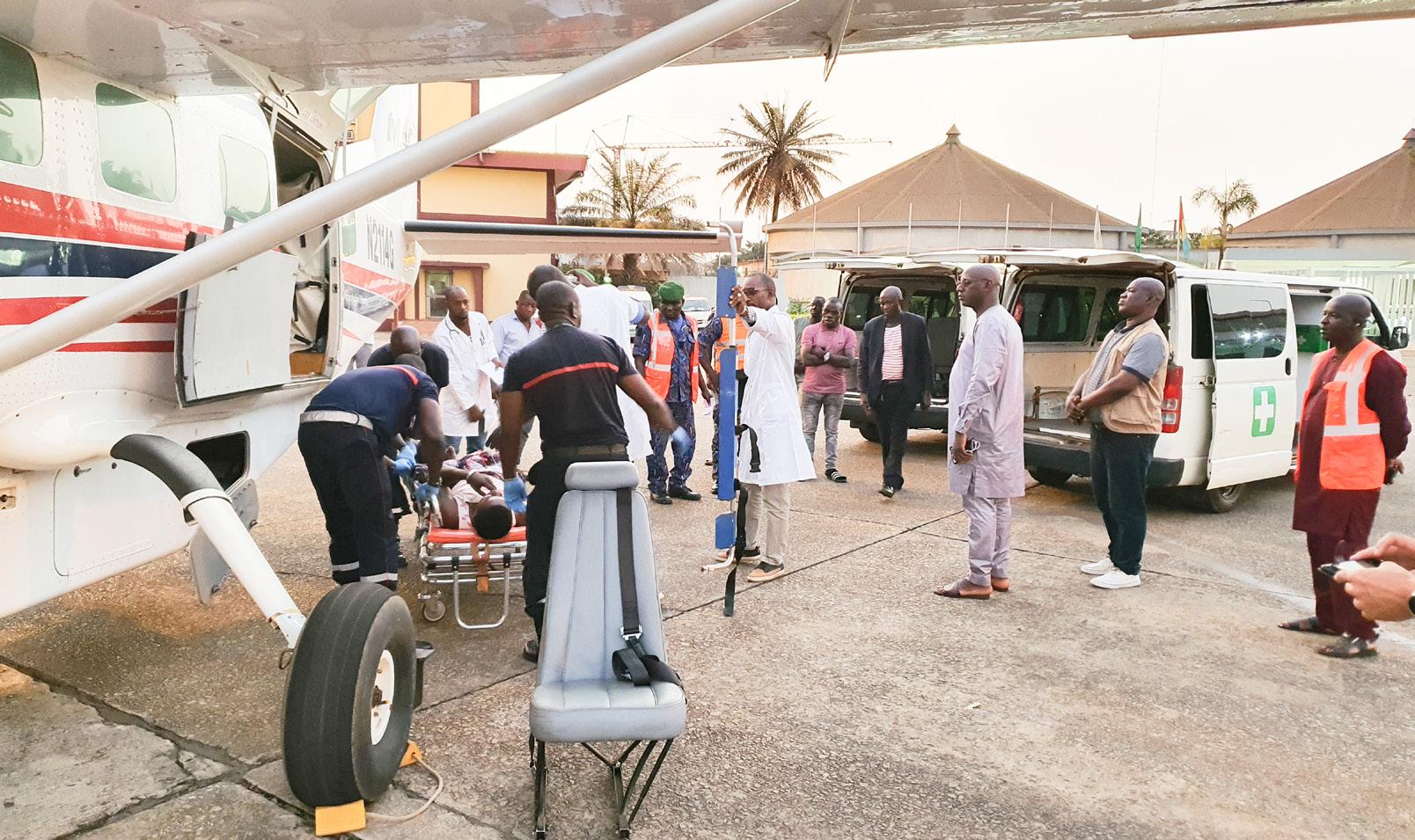
MAF Guinea carried out medevac flights following a tragedy which sparked a wave of emotion in the country.
An MAF plane joined a massive national rescue effort after a horrific bus crash in Guinea, which killed 16 people and left more than 50 injured.
The bus was travelling from Macenta to Conakry on April 24 when a tyre blow-out caused the longdistance bus to plunge into a ravine in the prefecture of Gueckedou.
Health authorities said 45 of the injured were initially admitted to the Macenta hospital, including 23 seriously injured, and seven others were taken to the Gueckedou hospital.
MAF flew two flights, transporting seven seriously injured people. On the first flight were a 35-year-old woman, a 42-year-old woman and a 30-year-old man with head trauma and fractures, plus a 45-yearold man with spinal injuries and fractures.
The second medevac flight carried a 40-year-old woman with fractures and dislocation, a 35-yearold man with head trauma and serious injuries and a 42-year-old man with head trauma and fractures.
Colonel Alseni Camara, prefect of the town of Nzerekore, a southeastern region 1000 km from Conakry, expressed gratitude for the involvement of MAF.
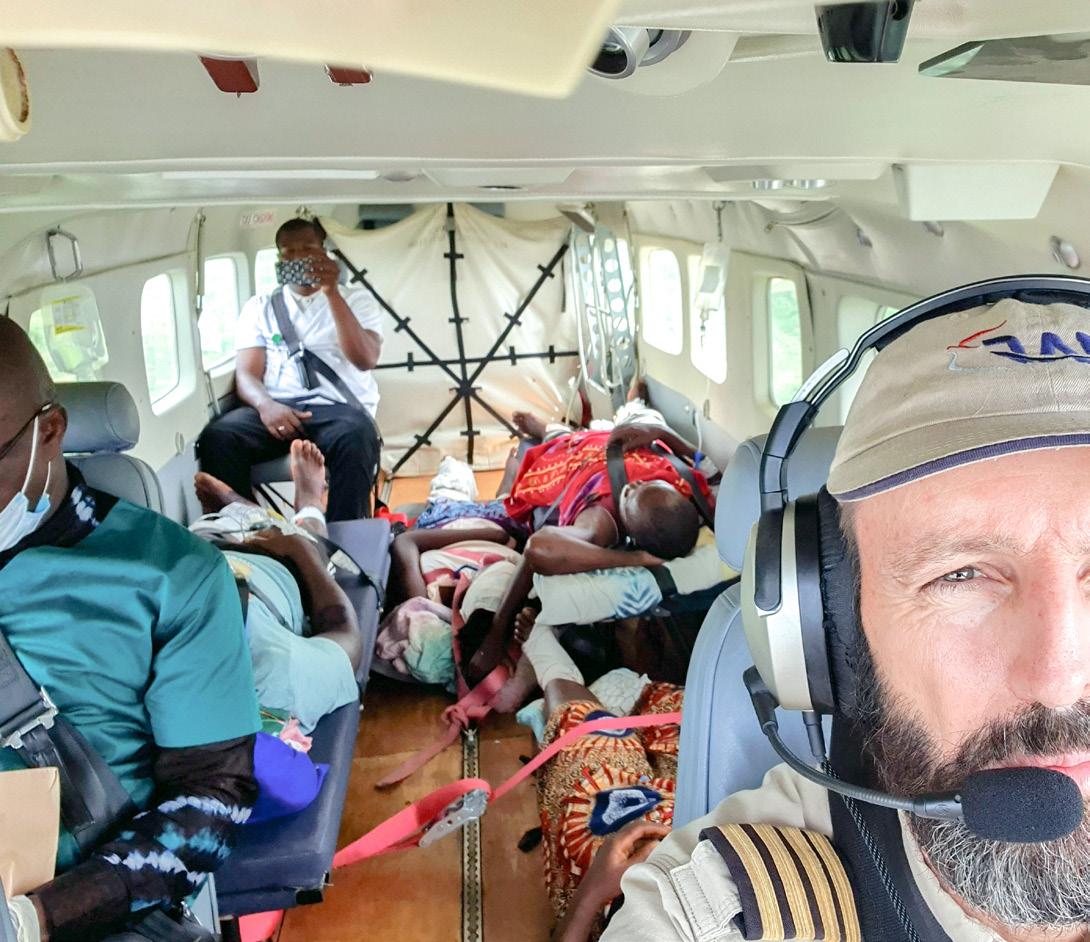
“We would really like to thank the support which frankly relieved us today, given the seriousness of the accident we had difficulties with our patients,” he said. “We have seen that the government’s effort has borne fruit and MAF has also borne fruit, not only in helping these patients. Congratulations to MAF. We always stand by them, and we are ready to support them.”
Among those who died were two children and five women, according to health authorities.
Conte Fodé Badra, deputy national director of public and private hospital establishments, welcomed the rapid response.
“We reached out… to companies that have helicopters and planes. Praise God! We were satisfied with their prompt response,” he said.
“An accident of such scale when patients are transported by plane and helicopter from the scene of the accident, therefore from Macenta or Nzerekore to Conakry, this is a first. The government is satisfied. The Ministry of Health is satisfied. The Guinean population is satisfied, very satisfied with their prompt response to help the injured.”
Pilot Brad Ballin was glad that MAF could respond to the government’s request and play an important role in helping the survivors.

“Without the help of MAF, the more seriously injured casualties of the bus accident would likely have had to endure many hours of rough road travel (20+ hours from Nzerekore to Conakry) to access the necessary medical assistance that could only be provided in Conakry,” he said.
“It is highly likely that such a road trip, apart from subjecting the injured to unnecessary further pain and suffering would have had a negative impact on the outcomes of their continuing recovery.”
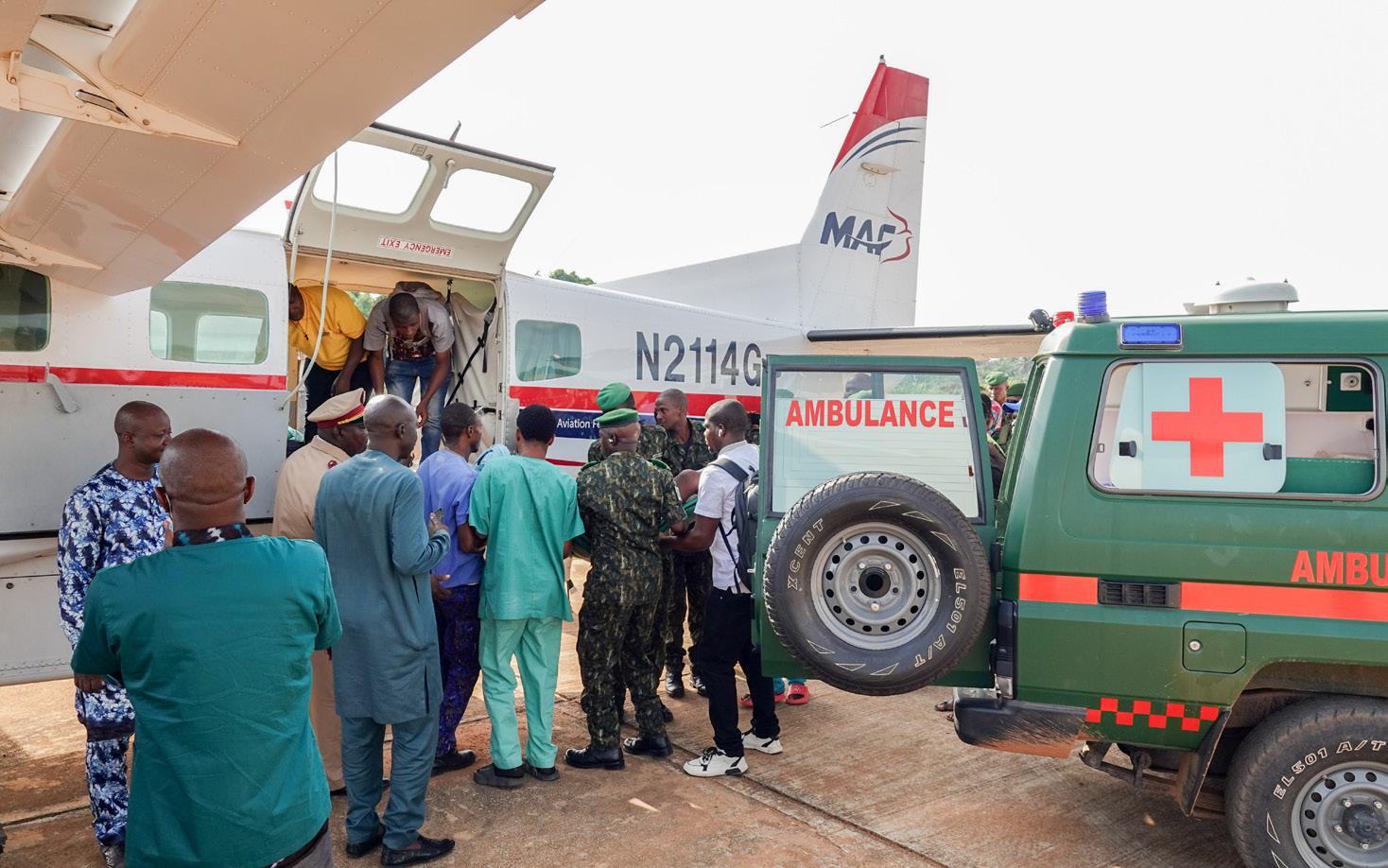
“It is a testament to the entire MAF Guinea team that we were able to complete the two medevac flights and demonstrate Christ’s love to those in need safely and successfully.”
We are told all seven patients flown by MAF are now in a stable condition.

Guinea is one of MAF’s newest programmes, with operations beginning in 2022.
MAF Guinea has one Cessna 208 aircraft.
Barriers
Vast distances and unpaved roads make travel by 4x4 incredibly difficult and costly. Only 5% of the road network is paved.
Larger vehicles, including mining trucks, are often overloaded, increasing the degradation of the roads.
2023 Statistics
• 289 hours flown
• 331 passengers flown
• 4,438 kg cargo flown
• Pioneers Bible Translation
• Mission Philafricaine
• AMEG Association Medicale Esperance de Guinee
• Catholic Relief Services (CRS)
• SIM International
Scan the QR code to hear from Will Jones, founder of Awakening Ministries International, one of our partner organisations in Guinea.
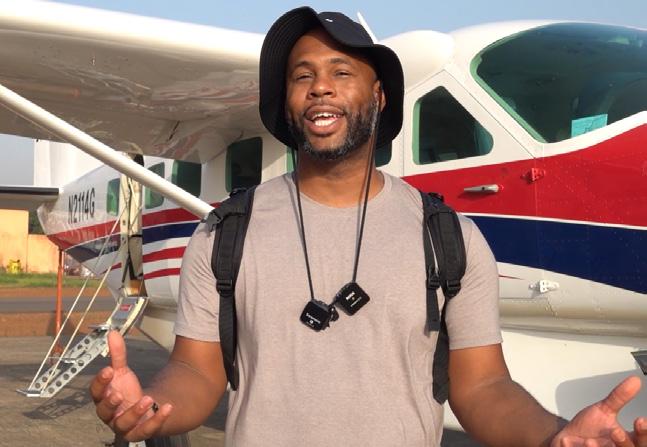
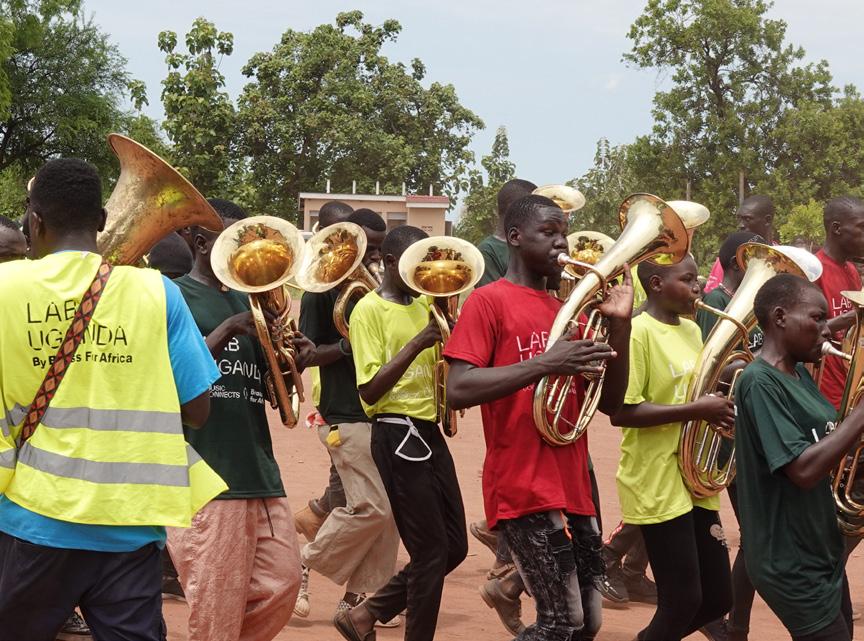
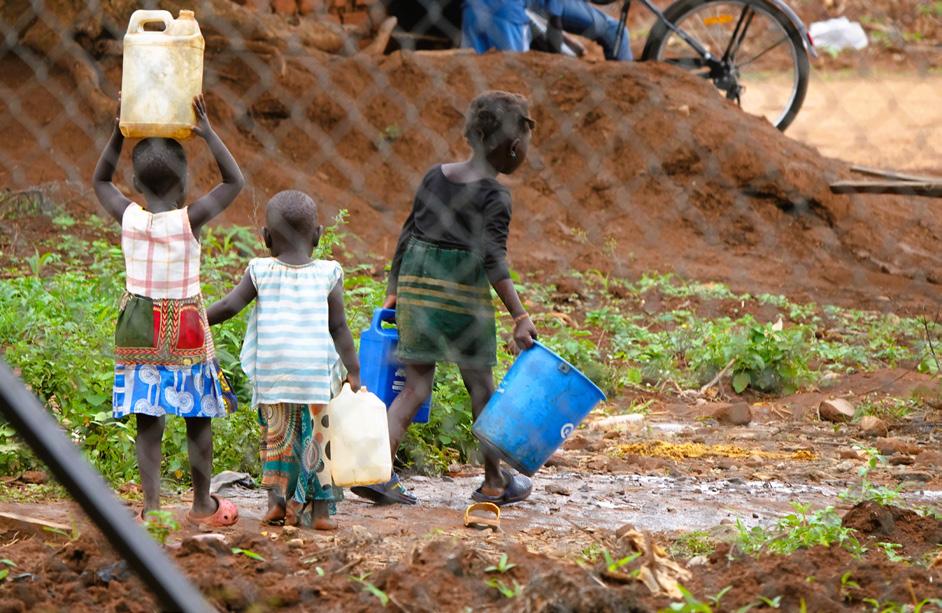
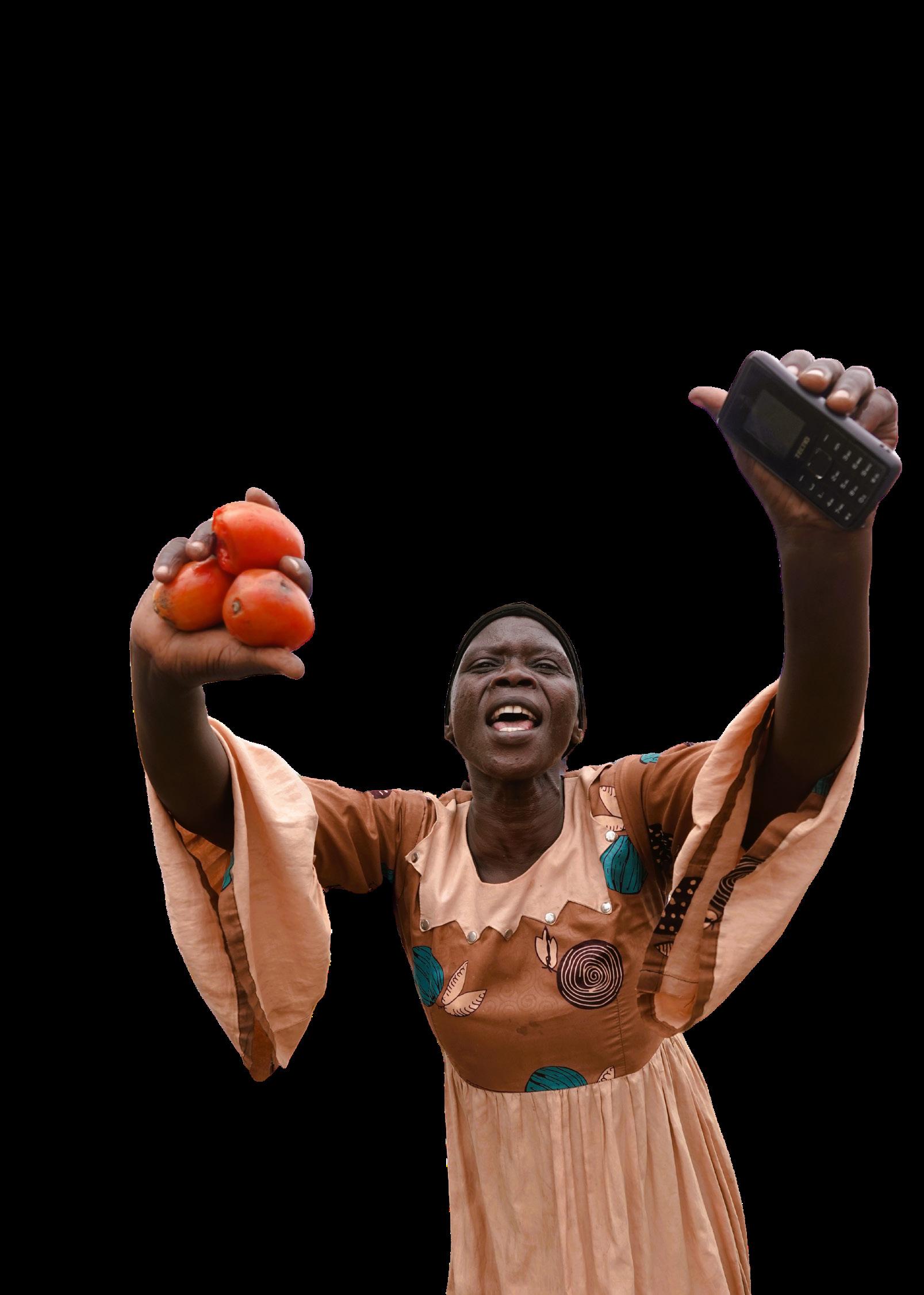
Want to hear their music? Scan the QR code to watch a video feature from World Refugee Day.
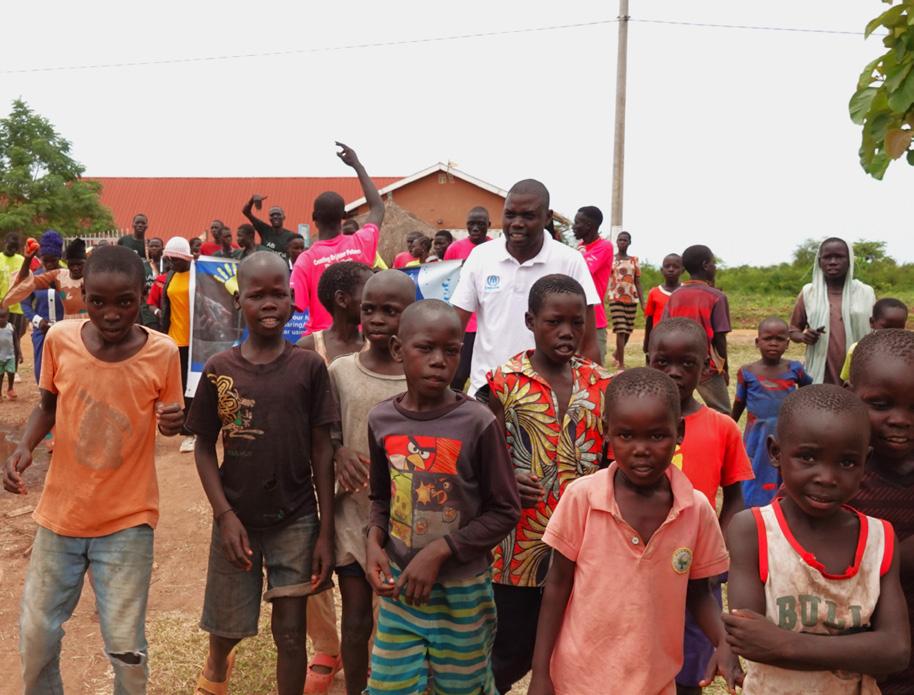
War broke the family apart and left a mother singlehandedly fending for her six children in a foreign land. One of those children was Sarah, who is now 19.
Mission Aviation Fellowship flies to Arua in north-western Uganda four times a week, and some of its passengers are Brass for Africa, who support refugees like Sarah Kojo Moses.
If it were not for a MAF flight, it would take the organisation an entire day’s travel by road, in order to access Bidibidi, the second largest refugee settlement in the world, home to Sarah for the past six years.
Brass for Africa uses music to reach the hearts of refugees, to help them heal from trauma and depression. When they started a music programme at the settlement three years ago, South Sudanese refugee Sarah joined the team and her healing started.
“This programme has greatly changed my life. Since I joined in 2020, I have found myself. I am more confident now than I was before. I have changed from a nobody to a somebody. I even counsel my friends who are facing big challenges in the settlement,” Sarah says.
Sarah is now 19, but many teenage girls didn’t get the same opportunity to learn.
“There is a big problem of early marriages here. Parents are not
able to take care of their children, and the children spend their day moving around the villages. Many of them don’t go to school and so the girls get married to much older men, some fit to be their fathers,” she adds.
Sarah’s sister is one of the girls that fell victim to cross-generational relationships.
“When we came from South Sudan, my mother could not take care of all of us, so my aunt took responsibility for my big sister.
But she did not take good care of her, so my sister got pregnant at 16 and was married to an old man. My aunt said it was useless to take a girl to school because education is for boys.”
Sarah says that other girls like her end up selling alcohol. Early pregnancy is also a common occurrence at Bidibidi refugee settlement.
But programmes like Brass for Africa keep the young girls and boys busy, giving them a positive focus.
“We are creating awareness on menstrual and mental health and handwashing in the schools and community here. We recruit health ambassadors from among the refugees, who we train and send them back to share the knowledge in the communities. We also hold community sessions,” says Molly Nabwami, Brass for Africa’s project health officer.
Molly says that the health needs
at the settlement are enormous.
Sarah considers herself an orphan, because since they escaped from the war in South Sudan, they got separated from her father and she thinks, he might have been killed, like her younger brother who was murdered in cold blood, by the rebels.
“Music is helping to heal my trauma and stress. It’s a journey. When I want to release stress, I play music, go to a private place and cry or visit my friends,” she says.
Like many refugees, Sarah would not like to return home to South Sudan even if things changed. “I wouldn’t like to go back to my country. Maybe I will change my mind in future.”
Mission Aviation Fellowship is committed to working with organisations like Brass for Africa, to ensure that refugees in Uganda receive the help, hope and healing that they need. The settlement at Bidibidi was opened in 2016 during the time civil war broke out in South Sudan. The refugee settlement covers 260 square kilometres.
“The presence of MAF flights is very helpful because it takes 14 hours or longer to get to Yumbe by road. Time is key for our staff, especially for our senior management and guests. MAF flights allows us to get to the settlement faster and easier,” says Brass For Africa’s Country Director, Andrew Agassi.
STORY & PHOTOS / DAMALIE HIRWA
Talk to your solicitor, or if you
‘Education is not just a luxury; it’s a fundamental right.’
Street Child of Liberia, supported by MAF flights, reaches rural areas to give children an opportunity to learn.
Abednego V. Johnson leads the office of Street Child of Liberia in Harper, Maryland County, where he works tirelessly to provide a path to education for those left in the shadows.
“Education is not just a luxury; it’s a fundamental right,” says Mr Johnson. “Our mission is to ensure that every child, regardless of their circumstances, has the opportunity to learn and prosper.”
The group, which relies on MAF flights from Liberia’s capital Monrovia to Harper in the southeast, drives initiatives which extend to helping children get off the streets, focusing on education and community development.
“We recognize that building schools is just the first step,” he says. “To truly make a difference, we must empower the community to sustain these schools themselves.”
One key strategy involves empowering local educators, often community members, to teach in these newly constructed schools, fostering a sense of ownership and sustainability.
The difficulties of travelling by land are one of the biggest challenges. MAF flights support the work of the Harper office but, from there, staff reach outlying areas by vehicle or bike.
“For over months and years, we’ve been struggling with transportation challenges,” says Mr Johnson. “But thanks to the support of organisation like MAF, we’ve been able to overcome these obstacles and reach even the most remote communities.
“Our partnership with MAF has been invaluable. Without their support, many of our projects would remain worthless in the rural areas.”
As they prepare for another mission to help give children the opportunity to get into classrooms, Mr Johnson insists: “Our work is far from over. But with the support of organisation like MAF and the unwavering determination of our team, we will continue to light up the path to education for generations to come.
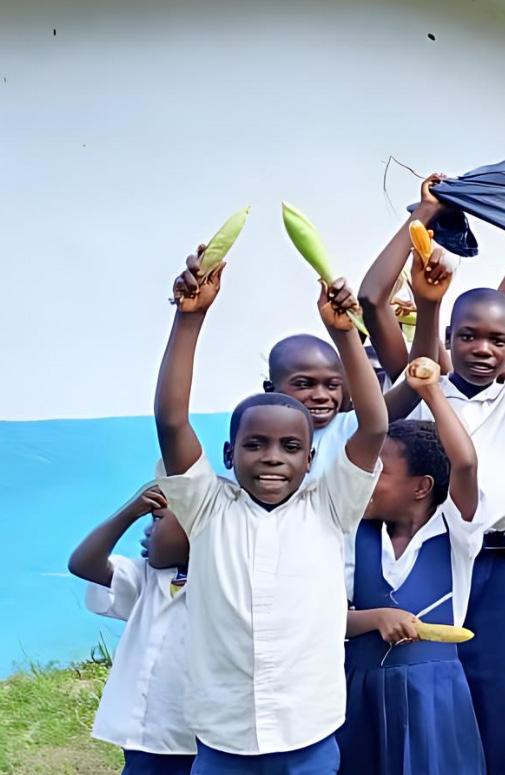
“We build schools in rural communities, sponsor, and support volunteer teachers to teach in those schools.”
“We also have a professional social worker team who go into various communities, work with community leadership to identify children who are not in school. We support them by providing all necessary schooling materials for them to go to school.”
Street Child also provides grants to caregivers/parents to run a small and profitable business to help support and maintain their children in school. It also conducts business training for caregivers/ parents to enhance a good business idea so they can sustain their families.
Mr Johnson adds: “In one of the communities we built a school, kids of that community could hardly understand English.
“They only spoke and understood the Grebo dialect. After we built the school and active learning started over a few months, the children are now speaking English to their parents. Parent, grandparents, and relatives thanked Street Child for helping their kids have access to education. They called Street Child ‘the light that gives life’.”
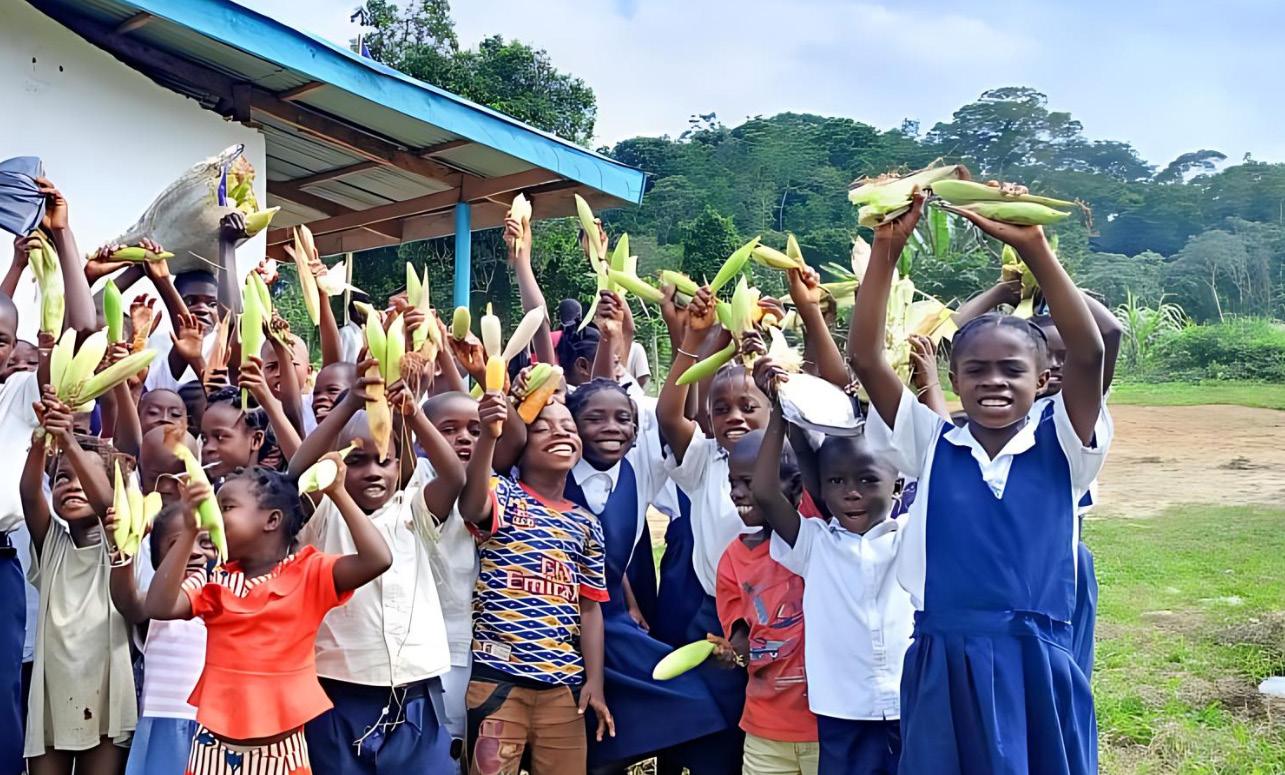
“Our partnership with MAF has been invaluable. Without their support, many of our projects would remain worthless in the rural areas.”
- Abednego V. Johnson, Street Child Liberia
2022 report of 104 Organisations who partner with MAF in Liberia.
How does MAF’s flight service impact your organisation’s ability to conduct your activities in Liberia?

How does MAF’s flight service impact how your organisation determines where to work in Liberia?
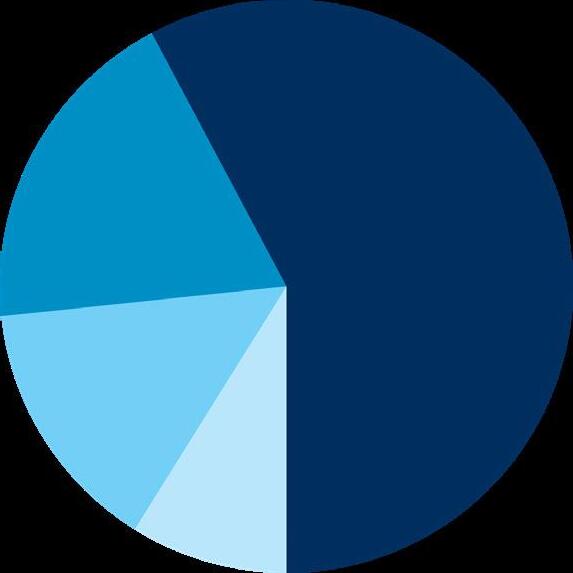
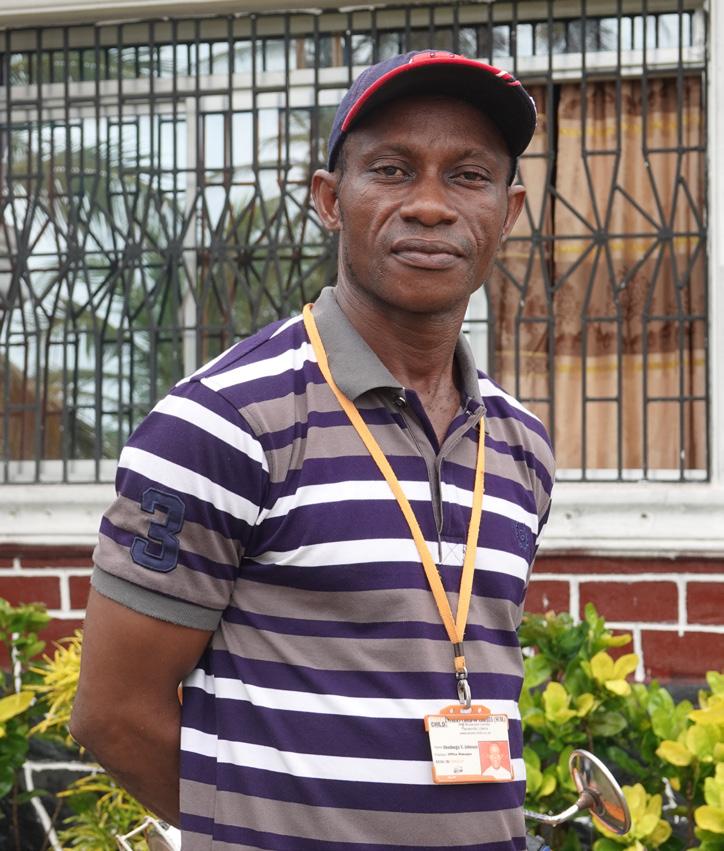
How important is MAF’s flight service in your organisation’s planning for future programme opportunities in Liberia?
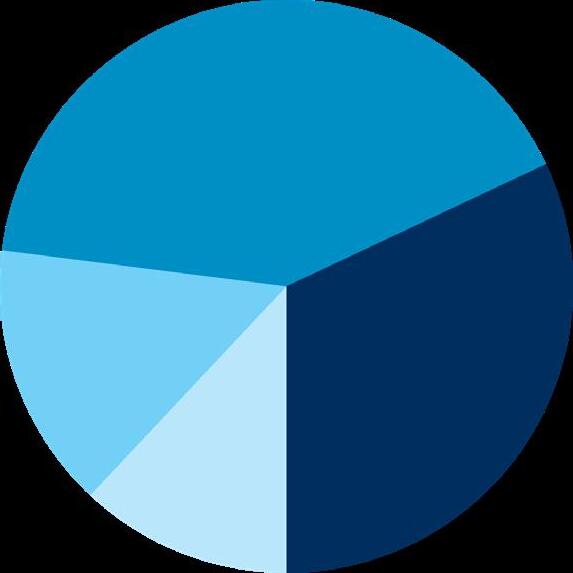
“In my library at home in the United States, I have many books. And the typical library of a Christian pastor here in Chad would be a Bible and maybe one or two other helpful books.”
American pastor David Mumford describes the difficulties he knows he will face, as he travels to southern Chad on a MAF flight from the capital Ndjamena. His team visit Chad twice a year for two-week modules where they train Chadian pastors and teach on important topics of scripture. There is a strong appetite to grow, but the resources available to the local church are limited.
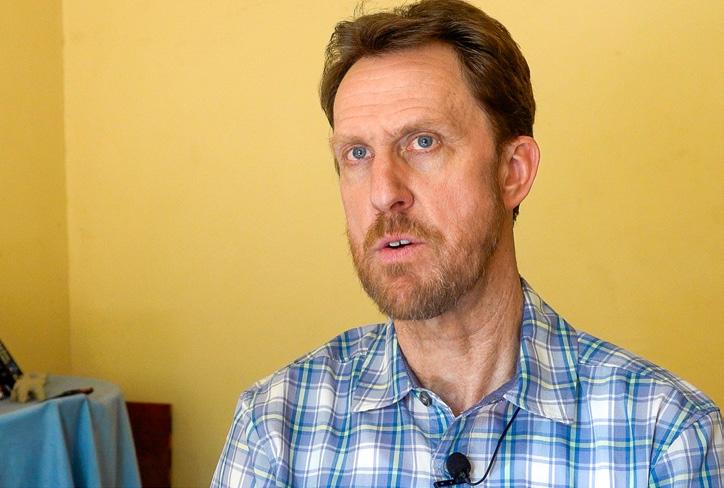
“The Gospel of Jesus has been in Chad for about 100 years, so there are many churches, Baptist churches and other evangelical groups,” he says. “One of the biggest problems, however, are resources and the lack of training. And this is what the Chadians themselves are telling us.
“We have had people come from as far as one thousand kilometres away, traveling by motorcycle, bus, even by boat, to get to this training. The training is very affordable. It cost almost nothing to the Chadians. Many of them are very poor.
‘So, it is really our joy to be here and to give them this material. We come
with workbooks in hand, that’s handed to them and then we teach throughout a two-week session with many questions and practical exercises. We try to be as practical as possible.”
About 50 years ago, there was a tremendous persecution in Chad. From 1973 to 1975, first Baptists were targeted, and then other evangelical groups were cruelly put to death by the government. This had a serious impact on the Chadian church.
Eventually the persecution ceased and there was a revival.
David states: “A lot of the American missionaries who had been instrumental in founding the Church here in Chad had to leave. So, the Chadians were on their own from about 1975 onwards.
“13 of the first who were martyred were from this town just a short few miles away. This is where they were killed. Some of their children have gone through our program and have benefited from that. And since it’s been 50 years almost to the day since those events took place, we are here on this particular trip, kind of commemorating those events and celebrating their faith because they stood firm until the very end and paid for their allegiance to Jesus Christ with their blood.”
David considers this leadership program, a way for those who had to leave back in the 70s to come back and again give some help to the Chadians.
David believes MAF flights are key to the effectiveness of the team’s work because the alternative would be a gruelling all-day journey.


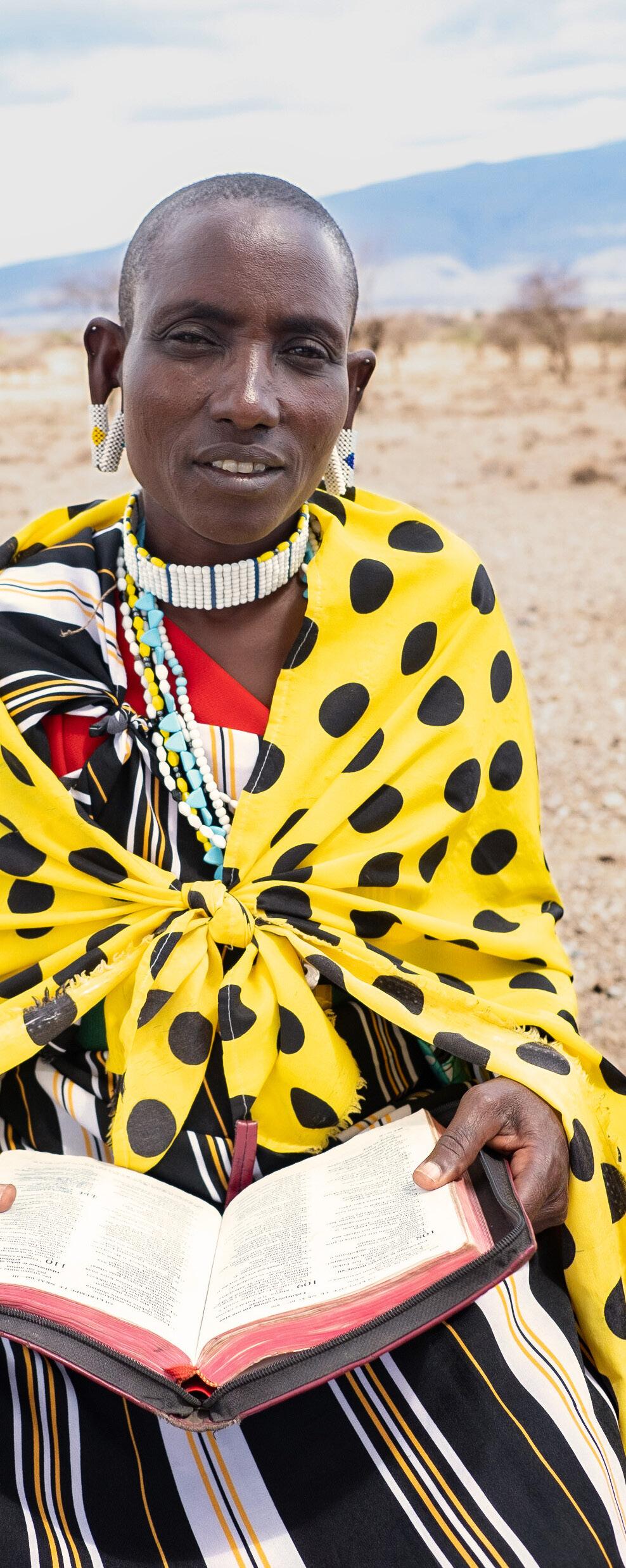
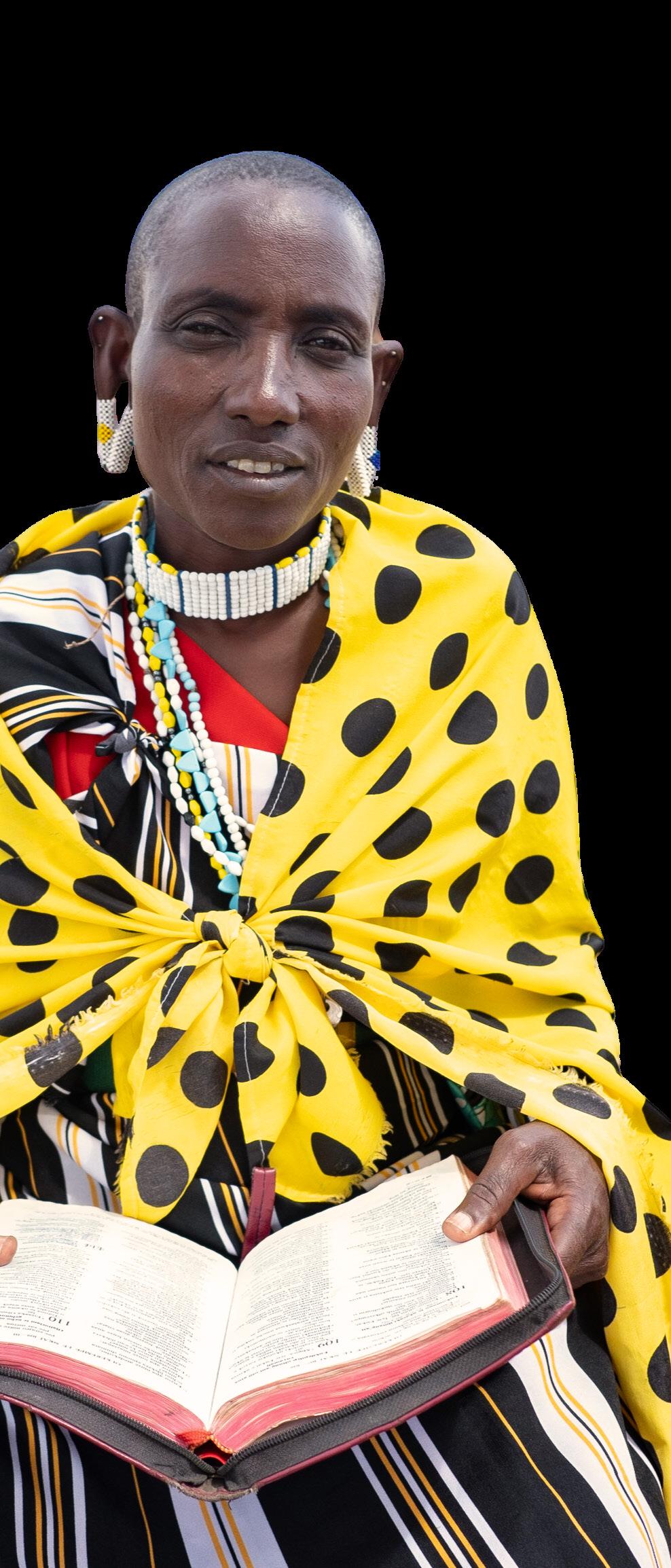
MAF is helping to enable Christian evangelism all around Africa. Elisha Moita, Evangelist and Founder of Malambo Discipleship Training Centre (MDTC), Tanzania, said:
“Since we started to fly with MAF, the Good News of Christ has travelled to considerably further villages than before. Today, we have over 20,000 people committed to Jesus within the villages of the Malambo region.”
“One significant help to our ministry over the years has been these MAF flights, which translate a 16 hour bus trip into two comfortable 2 1/2 hour flights from Ndjamena” he says.
“We have a couple of other possibilities. Hitchhiking is not one of them. The bus is a possibility. And that’s about a 14-to-16-hour drive. And it is a very difficult drive, very uncomfortable. I’ve done it before.”
The air link with isolated communities has also proved important when medical treatment, or supplies have been urgently needed.
“MAF has been a real help to us on a number of occasions as we have either come in or gone out,” David adds.
“We’ve evacuated a Chadian pastor. One of the pastors, an American pastor, was coming to teach and on his way out he brought with him a Chadian pastor, who was the director of the school, one of the key people here, he’s almost 80 years old and he has heart problems.
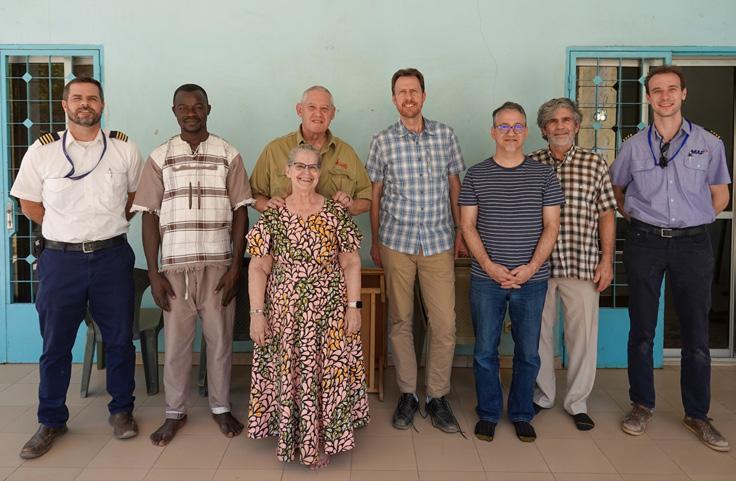
“I’m really thankful, my team and all my colleagues, we are super thankful for MAF.
STORY & PHOTOS / PAULA ALDERBLAD
Every few weeks, MAF planes bring fresh food to missionaries sharing the gospel in remote areas of South Sudan. The ministry was started by MAF spouses to help to sustain missionaries in places where food is not readily available – unless you grow it yourself.
Last year MAF South Sudan carried more than 1,563 kilograms of groceries, which the MAF ladies spend hours buying, packing and labelling in the capital Juba.
A flight in February carried produce to the north of South Sudan. Packaged in the bags and boxes were tins of dried milk power, oats, noodles, and serviettes.
‘These are groceries for missionaries working in areas near the border. They have chartered a flight to bring in some solar panels and asked us for lots of groceries to fill up the plane,’ says Groceries Run Administrator Mieke de With.
Mieke explains that demand has increased as missionaries have struggled to access supplies due to lack of availability and high market prices. ‘In these areas, food used to come from across the border in Sudan. There have been very few deliveries since the outbreak of the civil war in April 2023.’
In March, at the opposite end of the country, another order was dispatched to missionaries engaged in church planting and discipling indigenous believers in Eastern Equatoria State.
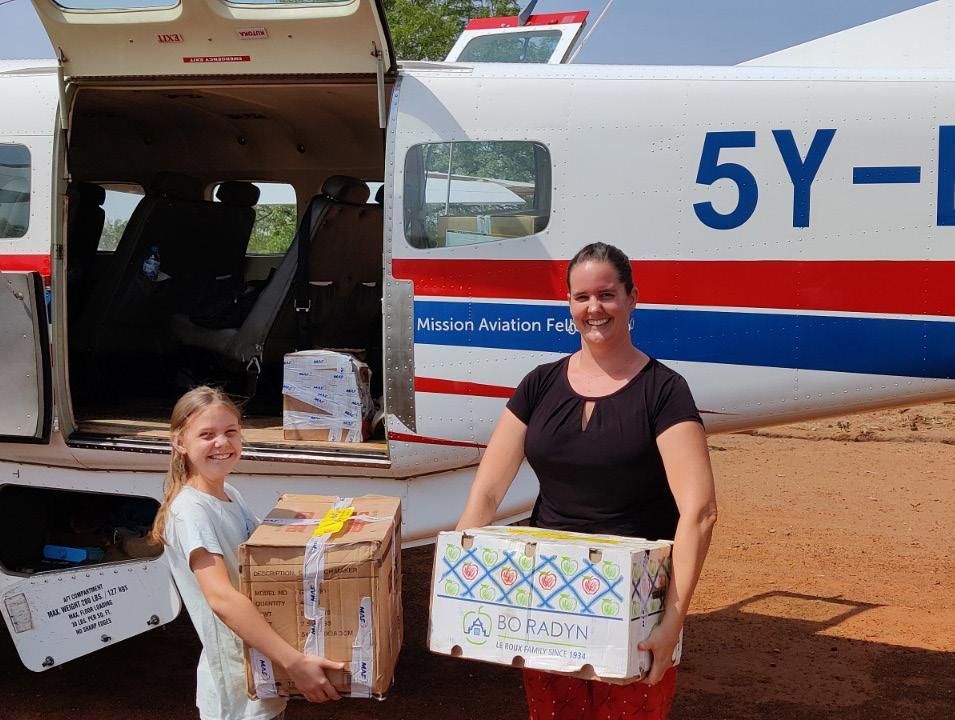
Pilot Tobias has delivered tons of groceries over the past five years and he looks forward to the flight.
‘I enjoy the grocery flights because it means I get to interact with the missionaries. AIM (Africa Inland Mission) make good use of these flights in Eastern Equatoria to purchase additional groceries they buy in Torit,’ he says.
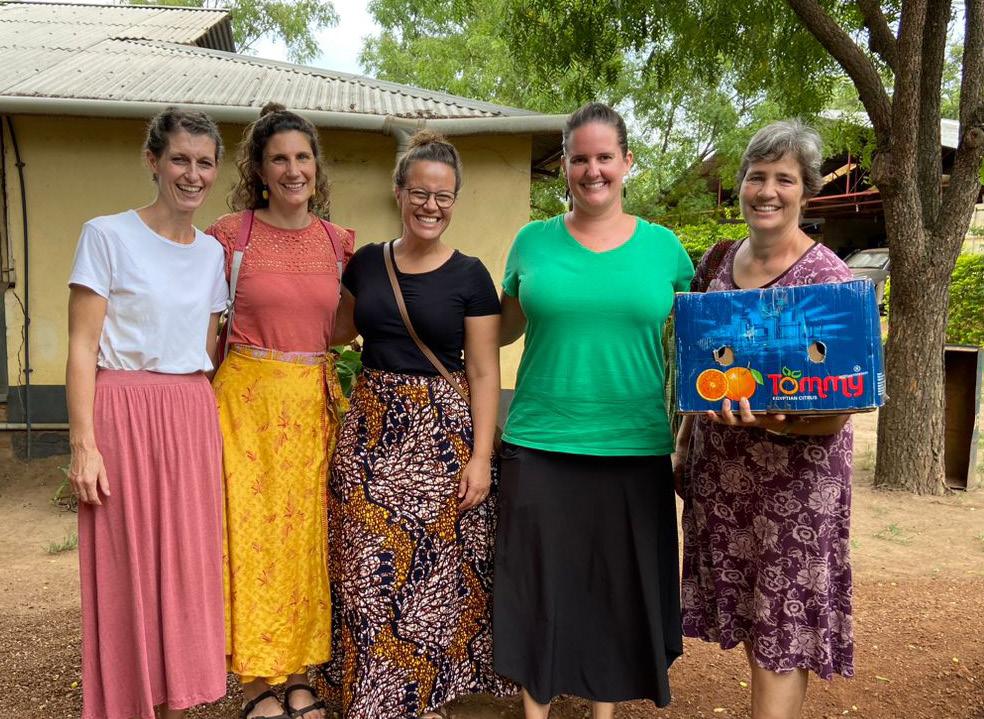
‘This makes for a busy day of loading and unloading, weighing and organising the boxes. Because we have dedicated flights, we also have time to spend with the missionaries and find out about their needs.’
Insecurity, seasonal rains and a lack of paved roads are a barrier to getting produce to market from the area where it is grown. The deliveries save missionaries potentially time-consuming travel which would take them away from their work.
Missionary mum of two, Emma Vermeulen, was able to join a grocery flight with husband Reuben at the helm. Also on board, was Mieke who brought her infant daughter Naomi in a carrier on her chest.
‘It was so nice to visit all the villages we provide groceries for. We met AIM Missionaries Linda and Phil Byler in Torit and heard about their history in South Sudan,’ Emma explains.
MAF’s Karyn Ball and Katrin Klassen accepted an invitation to fly to Torit to visit the missionaries they shop for.
‘We purchased milk, coffee, canned vegetables, fresh fruits and vegetables, insect spray and meat. The AIM team is very grateful, as they can’t get all these items in their locations,’ Karyn explains.
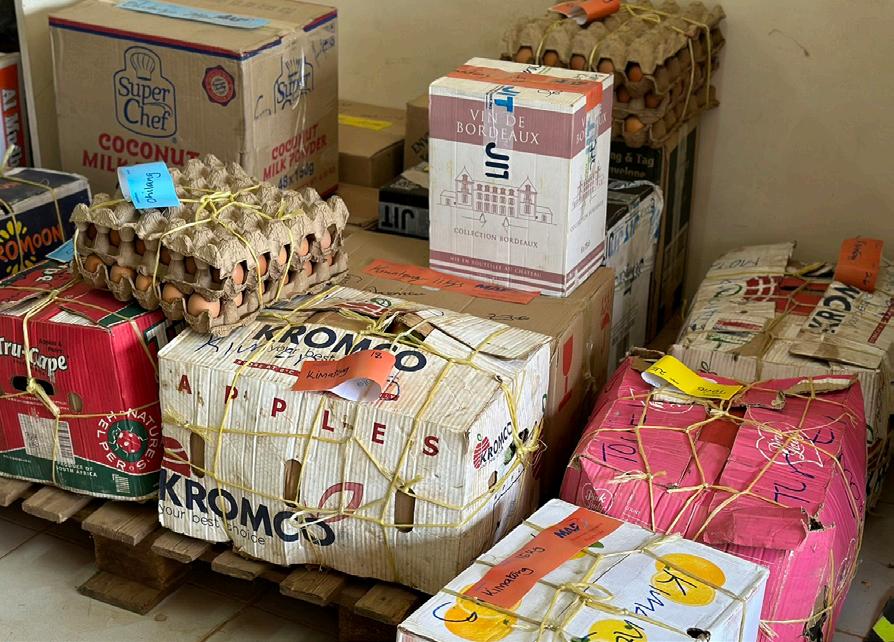
Karyn was delighted to see German missionary Hannah Zobel, with mission organisation Diguna, who drove four hours to see them.
‘The missionaries in Lohutok really appreciate all of the groceries we send their way and wanted to come and thank us in person!’
Back in the freight room, Mieke reflects on the need for the ministry as she prepares another order.
‘The grocery ministry means families can have nice, healthy food for their families. As MAF wives, it is nice that we can share the luxuries of Juba with the missionaries in the field.’
STORY / JENNY DAVIES
PHOTOS/ MAF SOUTH SUDAN TEAM
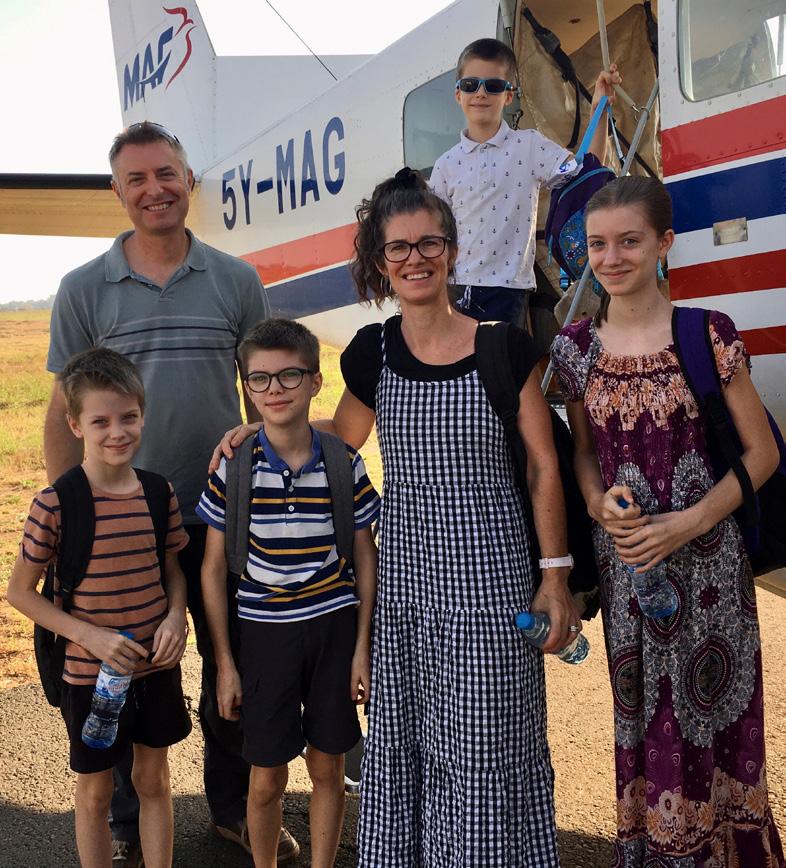
day
Jono & Michele Pound, along with their four children, Abby, Daniel, and twins-Jospeh & Benjamin, are Kiwi’s serving with MAF in South Sudan.
Jono is one of 47 staff at MAF South Sudan, including fellow Kiwi, Andy Macdonald. Both kiwis serve as Pilots.
The Pound family has been serving with MAF in South Sudan since 2022.
SCAN THE QR CODE TO WATCH THEIR DAY-IN-THELIFE VIDEO
